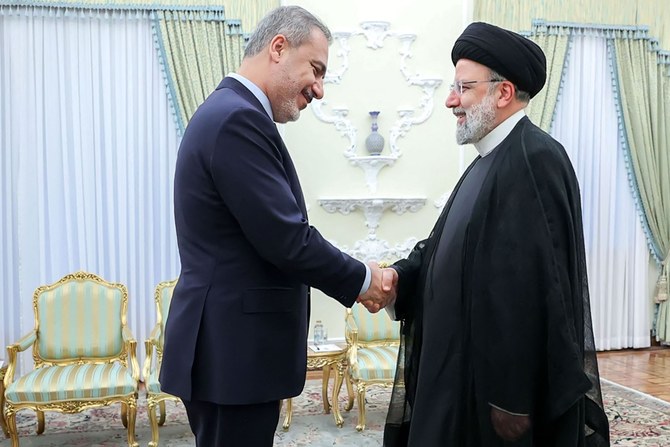
Turkish officials recently stated that they were talking with their Iranian counterparts about a military offensive against the outlawed Kurdistan Workers Party (PKK). Militants from the group are dispersed across the northern Iraqi region of Qandil. The offer of cooperation received a positive response from Tehran.
“We are in contact with Iran,” Turkish Foreign Minister Mevlut Cavusoglu said on June 13. “PKK is a threat to them as well. Qandil is a very close to the Iranian border…we will improve cooperation with Iran.”
Two days earlier, President Recep Tayyip Erdogan declared that Turkey had launched military operations to eliminate PKK, targeting its headquarters in the Qandil mountain region and in the Sinjar province of Iraq, and that 20 fighter jets had destroyed 14 PKK targets in the region. Ankara began preparations in early March for a large-scale operation against the terrorists scattered across the region, with special forces and scores of troops deployed on the difficult terrain to set up regional bases. Turkey now has 11 bases and more than 2,000 troops in Kurdish-controlled northern Iraq to carry out an assault against the terrorist group.
Turkey is mired in a bloody war domestically against the PKK and its Syrian offshoots, the Democratic Union Party (PYD) and its armed wing, the People’s Protection Forces (YPG). Last year, meanwhile, the Kurdistan Free Life Party (PJAK), an offshoot of PKK in northwest Iran, attacked Iranian border guards near the city of Urmiya, killing two and wounding seven. Iran is concerned that PJAK is a threat not only to the territorial integrity and national security of Iran, in the same way that PKK poses a threat to Turkey, but also to Iraq and Syria. Both Turkey and Iran are aware that separatist campaigns have been ramped up in these volatile times. They are rightly concerned that the extraordinary regional turmoil could fuel Kurdish fantasies of independence.
The Turkish-Iranian relationship is best described as “bitter frenemies,” based on temporary cooperation and tacit tensions.
Sinem Cengiz
Ankara and Tehran even cooperated in building a 144 km wall, with towers and iron fences, along the Turkey-Iran border to block the movement of PKK militants based in Iraq’s Qandil mountains bordering Iran and Turkey, and to prevent PKK and PJAK from smuggling arms to one another. In addition, Turkish and Iranian intelligence agents, along with Iraqi counterparts, took joint action against PKK in November 2017, targeting positions in northern Iraq.
Ankara hinted that both Iraq and Iran have given a green light to Turkish operations and are ready to throw their support behind the country’s forces. The Iranian support is highly significant, moreso than that from Iraq, especially in terms of intelligence. Iran is one of the main countries in the Middle East involved in proxy wars and intelligence gathering to aid its regional aspirations. It is no secret that Iranian military advisers have played a vital role in challenging the Syrian groups fighting against the regime of Bashar Assad in Syria, and in supporting Hezbollah in Lebanon, proving that Iran could extend its support to its regional allies and engage in regional conflicts.
However, what kind of a support Iran will give to Turkey is yet to become clear. Historically, although threatened by PJAK, Iran did not hesitate to support PKK’s aggression against Turkey to curb Ankara’s influence in the region.
As Robert Kaplan, an American author specializing in politics, foreign affairs and travel, said: “The Turkish-Iranian relationship is among the most complex of civilizational rivalries.” They are neither allies nor open enemies. In recent decades, the Turkish-Iranian relationship is best described as “bitter frenemies,” based on temporary cooperation and tacit tensions.
However, it would not be wrong to say that we are witnessing an era in which Turkish-Iranian cooperation in the region is greater than ever before. Ankara and Tehran have been strengthening relations at a growing pace in Syria. Both countries have been part of the Astana peace process, with Russia, since early 2017, and the Syrian National Dialogue Congress. The presidents of the two countries meet more than once in a year, as a sign of the increasing cooperation.
While Iran and Russia are working with Turkey in the Astana process to find a solution to the problems in Syria, particularly humanitarian issues and the formation of de-escalation zones, PKK has demonstrated its position by closely allying itself with Iran’s enemies, namely the US and Israel. Both Ankara and Tehran are angered by the US arming of the PYD, which Washington considers a partner in Syria. PYD has also drawn Iranian Kurds to its ranks, which is something closely monitored by Tehran with some concern.
Aware of all the balances in the region, Ankara implied that Iran should do more to support Turkey since the PKK and its wings are an existential threat to them both.
Needless to say, Turkey’s regional geopolitics and its cooperation with Iran will have a significant effect on Kurdish separatism. Both Turkey and Iran need collective security cooperation to defeat terrorism in the region. This would only be possible if Iran takes sincere steps as a neighbor not only when it is threatened, but for the sake of the stability and security of its neighbors — Iraq, Turkey and Syria — and the wider region.
• Sinem Cengiz is a Turkish political analyst who specializes in Turkey’s relations with the Middle East.
Twitter: @SinemCngz












